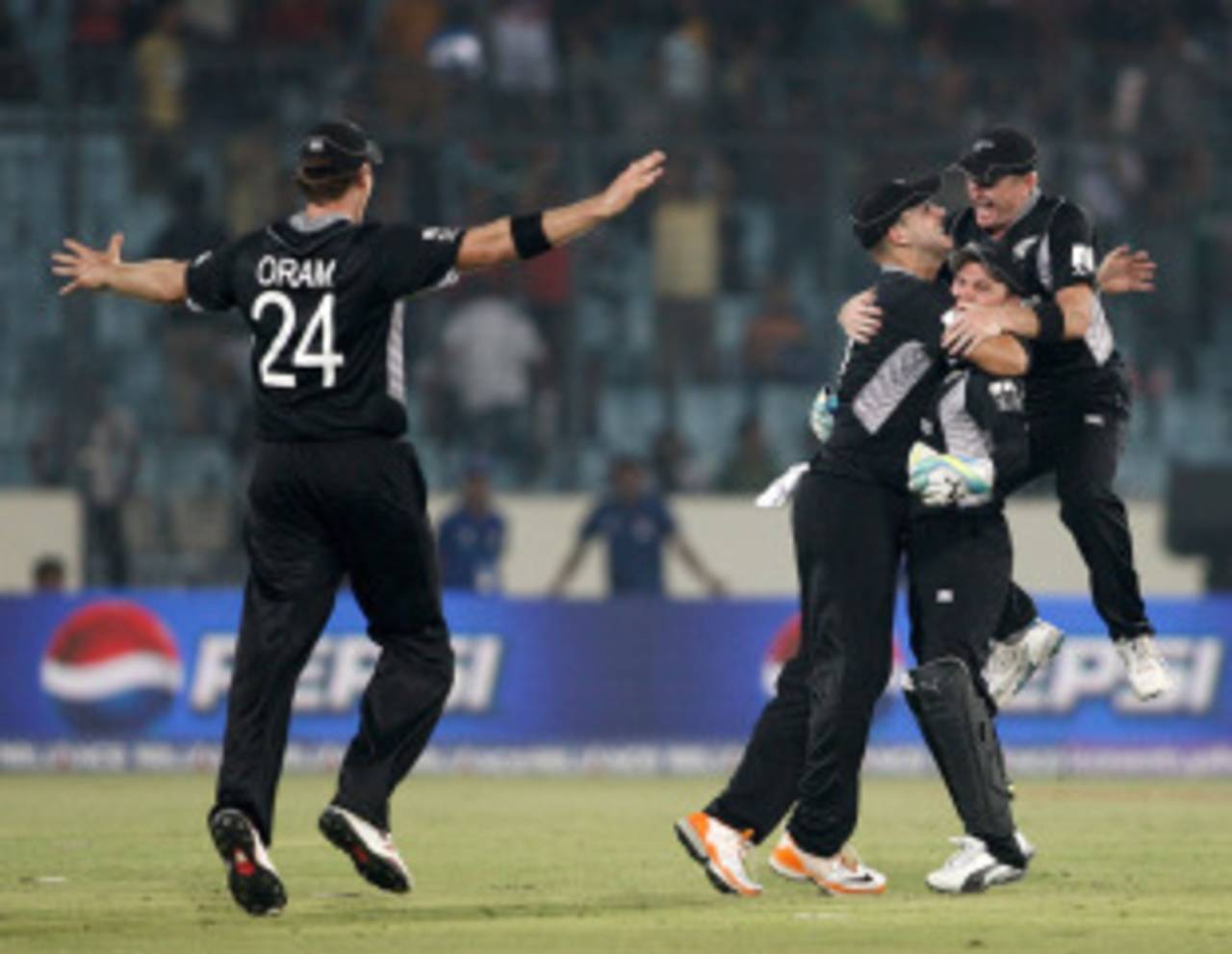Who is Kim Littlejohn?
New Zealand hope a man who brought professionalism to lawn bowls in Australia can do the same to the selection process in cricket
Brydon Coverdale
22-Sep-2011

Can Kim Littlejohn's selections inspire New Zealand to more such scenes? • Getty Images
John Buchanan's decision to appoint Kim Littlejohn as New Zealand's national selection manager didn't just come from left field, but from somewhere over the bleachers and into the car-park. Giving one of the most influential positions in New Zealand Cricket to an Australian lawn bowls manager was startling, even by Buchanan's standards.
But for all Buchanan's quirks, he is a man of precision, who speaks of systems and processes. Rash decisions do not fit with his style. So who exactly is Kim Littlejohn? Who is this man who beat former Test stars like Glenn Turner, Mark Greatbatch and Ken Rutherford to become the coach John Wright's co-selector?
The short answer is that Littlejohn, 47, is a former club cricketer, who has made a career in sports administration, first in baseball and then in lawn bowls. Renowned for his meticulous planning and analysis, traits that fit with Buchanan's modus operandi, Littlejohn has spent the past seven years as the high-performance manager with Bowls Australia.
He joined the organisation at a time when bowls was considered primarily a social game, but a sophisticated high-performance programme was needed. Australia's lawn bowls team had fared poorly at the 2002 Commonwealth Games, and government funding was made available to turn that performance around.
"That's where the degree of a level of professionalism needed to be introduced," the Bowls Australia chief executive officer, Neil Dalrymple, told ESPNcricinfo. "That meant performance measures and more analysis was introduced into the programme. Kim introduced some biomechanical analysis, statistical analysis, the use of video and tracking of player performance. In individual matches there was a lot of analysis of where the bowls were being delivered - bowl-by-bowl analysis. That was used as a coaching technique to feed back to the players.
"The real focus of the programme was with the 2006 Commonwealth Games and the introduction of part-time coaches and sports science, sports medicine, more of a fitness programme, which hadn't been part of bowls programmes in the past. He was the person who was employed to manage the introduction of those systems and personnel."
The results spoke for themselves. In 2002, Australia had not won a gold medal in Manchester, and managed just one silver. At the Melbourne Games, the team claimed three of the six gold medals that were up for grabs.
Dalrymple described Littlejohn as "very focussed". "He's a very hard worker and he'll stick to the task," he said. "He ticks the boxes. He's very careful on detail. Planning and detail are his strengths."
Littlejohn had joined Bowls Australia after serving for a year as operations manager at Baseball Victoria. The move into sports management was quite a change; he had previously worked in investment banking.
But Littlejohn's background had been in cricket, albeit at sub-elite levels. In 1983-84, he played 15 first-grade games - the next step down from state cricket - for the Southern Districts side in Perth. In more recent years, he was an assistant coach with the Melbourne University club, again one level below first-class cricket, and he ran the club's junior pathways programme.
Buchanan hopes Littlejohn can introduce to cricket selection, which has traditionally been based around part-time selectors, the kind of professionalism he brought to bowls. For his own part, Littlejohn believes cricket is the sport where he can offer the most
"He was a fantastic guy and very well organised," John MacWhirter, Victoria's chairman of selectors, who was at the time Melbourne University's director of cricket, said. "He was obviously highly intelligent and was fantastic with the kids. He was a student of the game."
That cricket background, combined with his administration skills, was enough to convince Buchanan, New Zealand Cricket's director of cricket, that he was the right man for a job that will be heavy on planning and analysis. As the national selection manager, Littlejohn will use the major association coaches as his key source of information on players.
"He can have good conversations with coaches or former selectors or former players because of the amount of cricket background that he has," Buchanan said. "I think that is sufficient for the job. One of his key roles is his ability to harness the knowledge and experience of so many experts over here. I think he's excellent at doing that."
Buchanan hopes Littlejohn can introduce to cricket selection, which has traditionally been based around part-time selectors, the kind of professionalism he brought to bowls. For his own part, Littlejohn believes cricket is the sport where he can offer the most.
"Of all the sports I've worked in, cricket is the one that I really understand the most about and can talk the language of cricket," Littlejohn said. "When I went and worked in baseball and lawn bowls I hadn't actually had any experience of those sports when I started to work in them, so it was a very steep learning curve for me to get up to speed on the sport itself. I can hit the ground running in cricket because I understand the sport back to front."
That's half the battle. Now all New Zealand need is for cricket in the country to understand Littlejohn back to front.
Brydon Coverdale is an assistant editor at ESPNcricinfo